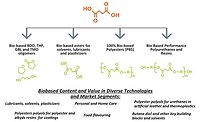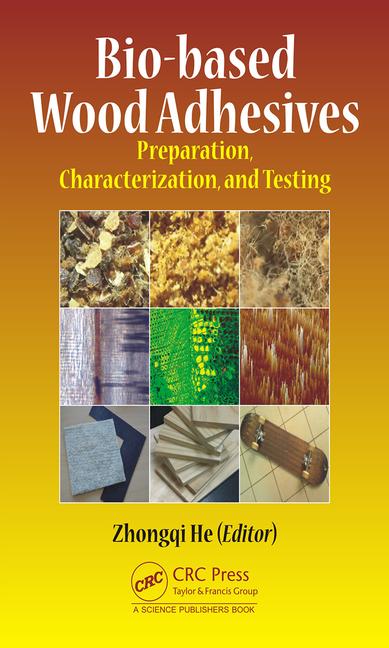ADVANCING ADHESIVES: Franklin Launches Bio-Modified Adhesives
New high-performance, bio-modified adhesives have been developed for use in the manufacture of engineered hardwood flooring.

Through research made possible via a grant from the United Soybean Board (USB), Franklin Adhesives & Polymers has developed two bio-modified adhesives. The Franklin International division incorporated a soy derivative into polyvinyl acetate (PVA) to create high-performance, bio-modified adhesives for use in the manufacture of engineered hardwood flooring (hardwood plywood).

At the same time, Multibond MX-100 brings superior performance and ease of use to wood flooring manufacturers. This one-part adhesive requires no mixing, which helps speed up production at the plant. It also offers good tack and a high percentage of solids (47-50%) for faster set times. In addition, it meets ANSI-HPVA HP-1-2004 Type II and ANSI/HPVA EF 2009 testing for water resistance on most wood species.
Soy extends the open time of this adhesive, making it ideal for use in prepress operations. Multibond MX-100 can go from the prepress to the hot press without the need for special mixing equipment. The parts come out of the prepress very tacky with the product. Multibond MX-100 also has demonstrated easy handling in a variety of climate conditions.
Multibond MX-200 performs well in immediate (direct-feed) hot press laminating operations that do not have a prepress. Like MX-100, it cannot be cold pressed. Formulated with bleed-through resistance, it is a fast, easy-to-use adhesive.
“We are grateful to the USB for its role in supporting research that led to the development of these adhesives and future products that use soy,” said Michelle Tobbe, wood adhesives technical director. “I think our customers will agree that we have developed the ideal blend of synthetic and natural materials to create environmentally friendly, cost-effective adhesives that are easy to use and perform very well.”
For more information, phone Franklin Adhesives & Polymers at (800) 877-4583, e-mail marketing@franklininternational.com or visit www.franklinadhesivesandpolymers.com.

Soy is a renewable resource that reduces reliability on petrochemicals, extends open times, is free of formaldehyde and offers physical flexibility.
Through research made possible via a grant from the United Soybean Board (USB), Franklin Adhesives & Polymers has developed two bio-modified adhesives. The Franklin International division incorporated a soy derivative into polyvinyl acetate (PVA) to create high-performance, bio-modified adhesives for use in the manufacture of engineered hardwood flooring (hardwood plywood).

The new bio-modified crosslinking PVA adhesives contain no added formaldehyde and meet California's CARB Phase 2 limits on formaldehyde emissions.
Characteristics
Franklin first developed Multibond MX-100, which uses the renewable resource soy to create an environmentally friendly adhesive. The bio-modified crosslinking PVA adhesive contains no added formaldehyde and meets California’s CARB Phase 2 limits on formaldehyde emissions.At the same time, Multibond MX-100 brings superior performance and ease of use to wood flooring manufacturers. This one-part adhesive requires no mixing, which helps speed up production at the plant. It also offers good tack and a high percentage of solids (47-50%) for faster set times. In addition, it meets ANSI-HPVA HP-1-2004 Type II and ANSI/HPVA EF 2009 testing for water resistance on most wood species.
Soy extends the open time of this adhesive, making it ideal for use in prepress operations. Multibond MX-100 can go from the prepress to the hot press without the need for special mixing equipment. The parts come out of the prepress very tacky with the product. Multibond MX-100 also has demonstrated easy handling in a variety of climate conditions.
Multibond MX-200 performs well in immediate (direct-feed) hot press laminating operations that do not have a prepress. Like MX-100, it cannot be cold pressed. Formulated with bleed-through resistance, it is a fast, easy-to-use adhesive.
Green Development
Franklin Adhesives & Polymers has been active in the development of environmentally safe products for decades, and offers a full line of adhesives to meet CARB and other global formaldehyde emissions standards. The division pursued soybean research because it is a renewable resource that reduces reliability on petrochemicals, extends open times, is free of formaldehyde and offers physical flexibility.“We are grateful to the USB for its role in supporting research that led to the development of these adhesives and future products that use soy,” said Michelle Tobbe, wood adhesives technical director. “I think our customers will agree that we have developed the ideal blend of synthetic and natural materials to create environmentally friendly, cost-effective adhesives that are easy to use and perform very well.”
For more information, phone Franklin Adhesives & Polymers at (800) 877-4583, e-mail marketing@franklininternational.com or visit www.franklinadhesivesandpolymers.com.
About Franklin International
Based in Columbus, OH, Franklin International was established in 1935 and is among the largest privately held manufacturers of adhesives, sealants, and polymers for commercial and industrial applications. Franklin integrates its core competency-emulsion polymerization-into a broad product offering, including glues, adhesives, binders, films, sizing compounds and more. These products are distributed across six continents for use in construction, furniture manufacturing, millwork, filters, pressure-sensitive paper products and fiberglass reinforcement.About the United Soybean board (USB)
The USB comprises 68 farmer-directors who oversee the investments of the soybean checkoff on behalf of all U.S. soybean farmers. Checkoff funds are invested in the areas of animal, human, and industrial usage; industry relations; and market access and supply. As stipulated in the Soybean Promotion, Research and Consumer Information Act, the U.S. Department of Agriculture’s Agricultural Marketing Service has oversight responsibilities for the USB and the soybean checkoff. Visit www.soynewuses.org for more information.Links
Looking for a reprint of this article?
From high-res PDFs to custom plaques, order your copy today!







